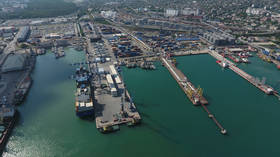Russia explains why its grain can't get to the EU

Russian grain exports can’t get to Europe because the sanctions imposed by the EU on Moscow effectively block supplies, Russian Foreign Minister Sergey Lavrov explained on Wednesday.
“Although Western countries keep saying that grain has not been sanctioned, they for some reason fail to mention that the ships that transport Russian grain are in fact under sanctions. European ports do not allow them in, there’s no insurance available and in general Western sanctions have disrupted the logistical and financial infrastructure that Russia uses to export its own grain,” Lavrov told journalists in Moscow.
The EU banned Russian vessels from entering its ports as part of the fifth package of sanctions adopted in April.
Lavrov’s comments follow accusations from Western nations that Russia is blocking Ukrainian ports on the Black Sea, something that Moscow has denied.
According to Kremlin spokesman Dmitry Peskov, Ukraine has blocked its own ports by laying mines that prevent ships from going out to sea.
UN Secretary-General Antonio Guterres said last week that the situation with the global threat to grain supplies had become alarming for developing countries.
The UN official also said the conflict in Ukraine and the resulting sanctions on Russia affected the prices and availability of fertilizers, and these factors combined were propelling the cost of wheat, which could worsen the food crisis globally.
Together, Russia and Ukraine export more than a quarter of the world’s wheat.
For more stories on economy & finance visit RT's business section













